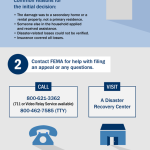

BATON ROUGE, La.— A quick fix may change your decision if you applied for FEMA help following Louisiana’s August severe storms and floods and you disagree with your determination letter.
Everybody has a right to appeal. Read your determination letter carefully to understand FEMA’s decision and know exactly what you need to do for your appeal.
Many times applicants just need to submit some extra documents for FEMA to process their application. FEMA can reconsider you in some cases if you:
- Submit insurance documents. Provide documents from your insurance company that detail your coverage or settlement is insufficient to make essential home repairs, provide a place to stay, or replace certain contents. FEMA cannot duplicate homeowner or renter insurance benefits.
- Prove occupancy. Provide documents that prove the damaged home or rental was your primary residence by supplying a copy of utility bills, driver’s license or lease.
- Prove ownership. Provide documents such as mortgage or insurance documents, tax receipts or a deed. If you don’t have a deed handy, contact your local or parish officials about obtaining a copy.
There are many other reasons you may disagree with FEMA’s decision. If you feel the amount or type of assistance is incorrect, submit an appeal letter and any documents to support your claim, including a contractor’s estimate for home repairs. You should have received a booklet called “Help After a Disaster” that explains what you need to provide for your situation. The booklet is available online at www.fema.gov/help-after-disaster.
Your letter should also include:
- Your full name
- Your registration number on all pages
- The FEMA disaster declaration number—DR-4277-LA—on all pages
- Your signature
Mail documents and your letter within 60 days of receiving your determination letter to:
FEMA National Processing Service Center
P.O. Box 10055
Hyattsville, MD 20782-7055
You can also submit them online at disasterassistance.gov or fax them to 800-827-8112.
If you have any questions about submitting insurance documents, proving occupancy or ownership, or anything else about your determination letter, you may call the FEMA helpline at 800-621-3362. If you use TTY, call 800-462-7585. Those who use 711 or Video Relay Service can call 800-621-3362. Lines are open from 7 a.m. to 10 p.m., seven days a week. You can also visit a Louisiana disaster recovery center and speak with a disaster assistance representative. Locate your closest center by going online to fema.gov/drc or by calling the FEMA helpline.

This graphic explains the appeals process for individuals who’ve applied for disaster assistance.
See original:


